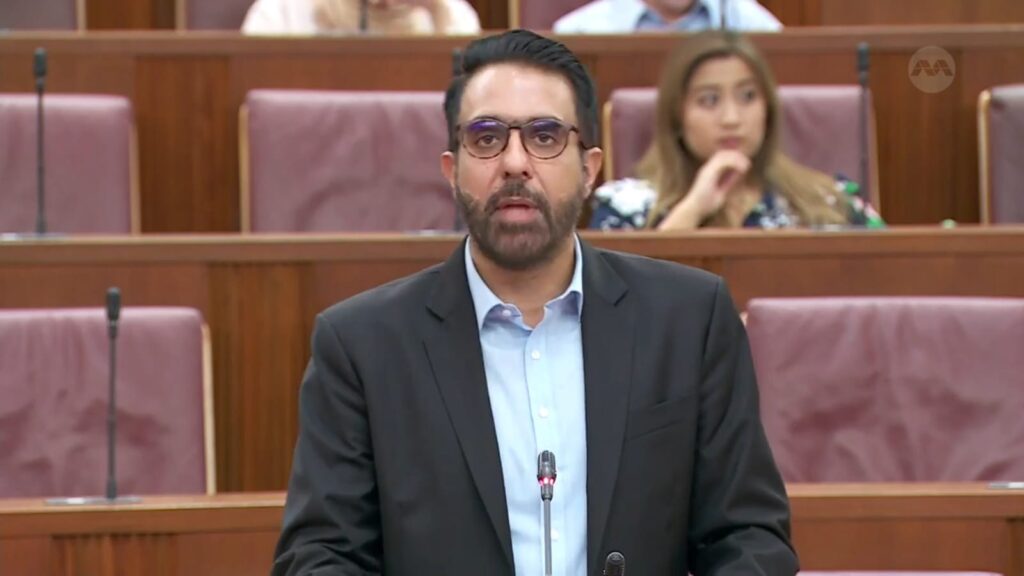SINGAPORE: Leader of the Opposition Pritam Singh said in Parliament on Monday (Feb 27) that he would advocate for an English test when assessing a person’s application for citizenship or permanent residency in Singapore.
This led Second Minister for Home Affairs Josephine Teo to express her misgivings on how much such a test could help, given that those inept in English are likely to be foreign spouses.
Mrs Teo also reiterated that instead of using a naturalisation test or interviews, the immigration authorities here “consider various markers of social integration” such as an applicant’s family ties to Singapore or whether they completed National Service.
The parliamentary exchange, which took place during the Committee of Supply debates for the Ministry of Home Affairs (MHA), was prompted by Mr Singh’s “cut” to the ministry’s proposed budget.
Individual Members of Parliament may ask for a symbolic “cut” of S$100 to a particular ministry’s estimates, before speaking on issues under that ministry’s purview.
Mr Singh told the House that with the nation’s total fertility rate dropping to a historic low of 1.05, new citizens would become even more important to the future of Singapore.
In his “cut”, Mr Singh questioned what Singapore’s goals should be when bringing in new citizens.
“We want those who truly know Singapore and want to embrace the Singapore way of life. We want those who really want to live here and be there,” he said.
“Singaporeans do not want new citizens who don’t want to live here but only want the power of the Singapore passport for their convenience, and a safe and secure environment for their assets and wealth.”
Mr Singh then raised the example of Switzerland, which he said has a highly specific selection process for new citizens that entails applicants showing themselves to be “successfully integrated” into the country.
For ordinary naturalisation, a person must have lived there for 10 years and hold a permanent residence permit. Applicants must also be able to answer questions on Swiss geography, history, politics and society.
Mr Singh asked MHA if Singapore has similar requirements, noting that the latest Singapore Census revealed that 48.3 per cent of Singapore’s resident population spoke English most frequently at home compared to 32.3 per cent 10 years ago.
“Is a working proficiency in English a criteria for citizenship for better integration between new citizens and Singaporeans of all races and religions, since English is our main language of communication?” he added.
“ALL TESTS HAVE PITFALLS”
In response, Mrs Teo said that while the Singapore authorities also consider an applicant’s ability to integrate in Singapore, they do not use a naturalisation test or interviews because “all tests have pitfalls”.
Sample questions for the Swiss naturalisation test can easily be found online, and interviews – if conducted at scale – will also take up resources and be uneven in quality, she added.
“Instead, we consider various markers of social integration such as family ties to Singaporeans, length of residency, whether the applicant studied in our national schools or completed National Service,” Mrs Teo said.
“These are assessed together with their economic contributions, qualifications and age.”
Applicants must also complete the Singapore Citizenship Journey before being granted citizenship. The programme was recently refreshed and enhanced with content co-created by Singaporeans, she added.
When Mr Singh asked Mrs Teo to confirm if an English test is part of the process of assessing permanent residency or citizenship applications, she asked if he was advocating that such a test should be applied before someone can be considered for permanent residency or citizenship.
“I believe it would be helpful so I would advocate for it,” Mr Singh responded while citing the latest Singapore Census report once more.
Mrs Teo then said: “I must admit to being quite surprised by his position.
“The reason being that, firstly, one can imagine that for most applicants for permanent residency and citizenship – if they have been in Singapore for a number of years, particularly if they had worked here, a facility with English is not surprising and I would think that the test need not be applied.”
She added that from the Government’s ground interactions, those who are not well-versed in English are “likely to be spouses of citizens or other permanent residents” who come from the same countries.
“Unless we’re saying that we therefore do not welcome such foreign spouses, I’m not sure to what extent a test of English that could be applied to prevent them from being considered would be helpful,” Mrs Teo said.
“Certainly, on the ground, every day, we meet with residents who cannot speak a word of English. And I don’t think anyone has suggested they are any less integrated to Singapore society.”
CRITERIA FOR ASSESSING APPLICATIONS
Mrs Teo also addressed queries from Mr Singh for more details on how new citizenships are granted, and how it would evolve in the face of the Government’s Forward Singapore exercise and a review of the social compact.
Detailed criteria for assessing citizenship applications, if publicised, could be “abused to inflate an undeserving applicant’s chances of success”, Mrs Teo said.
Singapore also has unique sensitivities by virtue of history and geography, she added, with most permanent residents and new citizens coming from neighbouring regions.
“We do not reveal our detailed criteria, or disclose country-specific figures on our PR and (new Singapore citizens) population, as this information could be misinterpreted or misused by others to stir up bilateral and domestic sensitivities,” Mrs Teo said.
